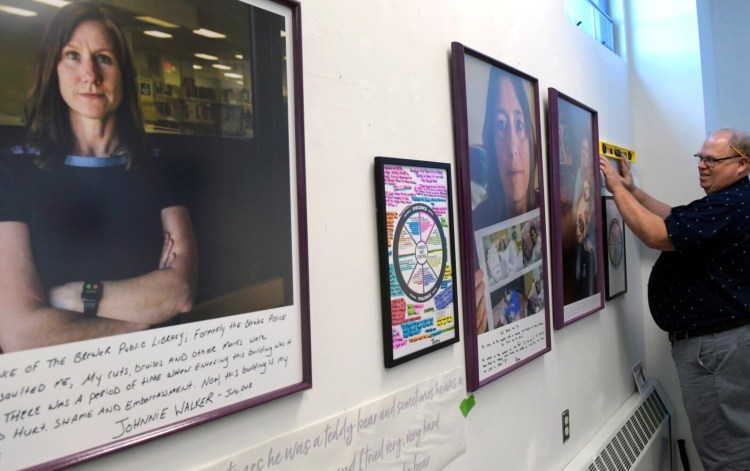The photos that Patrisha McLean has taken of herself and the 18 other women who have left abusive relationships are compelling on their own.
Earlier this week, as the “Finding Our Voices: Breaking the silence of domestic abuse” exhibit was being hung at the Holocaust and Human Rights Center at the University of Maine at Augusta, it was clear the portraits of the women would draw viewers in.
But what’s likely to hold their attention are the power and control wheels that accompany each portrait. The graphic illustrates the elements of abusive or violent behaviors that are used to establish control over abuse victims: Coercion and threats; intimidation; emotional abuse; isolation; minimizing, denying and blaming; using children; economic abuse; and male privilege.
McLean, 60, saw the wheel for the first time early on in her marriage.
“I wanted to become a domestic abuse advocate, and I wanted to get training,” McLean said.
When she read through the wheel, she thought, “My husband does every one of those things.” But she didn’t consider herself a victim of domestic abuse.
Twenty-five years later, a call to 911 shined a very public light on the breakup of her marriage to singer Don McLean, who pleaded guilty to misdemeanor charges of domestic violence criminal threatening, criminal mischief and criminal restraint as part of a plea deal after their divorce.

Betsy, a subject of Patrisha McLean’s multimedia show, “Finding Our Voices,” on display Tuesday at the Human Rights and Holocaust Center of Maine in Augusta. Kennebec Journal photo by Andy Molloy
When she looked at the wheel again in 2016 during a separation imposed by the conditions of her then-husband’s bail, Patrisha McLean said, all the answers were there.
“You have to open your eyes to them,” she said.
“When you walk in and see these women, for the most part they don’t look like abuse victims,” Patrisha McLean said. “It’s in the power and control wheel where you see their private hell.”
The women have used highlighters to point out what they experienced, and have added specific details in the margins.
This is the first time McLean has taken on a project like this. As a columnist for The Free Press in Rockland, she has profiled both homeless people and recovering drug addicts with photos and stories, to foster compassion, she said, and lift the stigma associated with both those conditions.
The difference here is that it’s a personal project.
“I’m really happy with how it turned out,” she said.
The exhibition debuted in Camden on Feb. 14. It has also been seen in Castine, North Haven and Islesboro.
The exhibit officially opens at a reception from 5-7 p.m. Thursday night at Holocaust and Human Rights Center, and it will hang through mid-December.
“It’s so rare to have the opportunity to hear individual people’s actual experience,” said Francine Garland Stark, executive director of the Maine Coalition to End Domestic Violence.
The nonprofit organization has been supportive of McLean’s project and served in a consulting role, helping to connect her with some abuse survivors and in thinking about the elements of the show.
Along with the portraits and the wheels, the exhibit includes audio recordings of the women featured.
“I am very happy she was able to capture people’s representation of their experience in the power and control wheel,” Stark said. “You also have the incredible audio recordings of the survivors telling their stories in their own voice with their own inflection.”
When people hear about domestic violence and abuse, she said, most of the focus is on the abuse, but the context of those instances of abuse is the ongoing pattern of coercive control and behavior.
“If this were isolated abuse, we’d be talking about it in a different way,” Stark said. “But it’s the ongoing behavior that creates the trap in which people find themselves.”
At the start, 14 women were featured. Since then, Patrisha McLean has added five more. And when the show moves on from Augusta to Portland, she’s hoping to add 11 more. The installation will be done in a different way but it’s too early to say how, she said.
For most of the women featured, this exhibit was the first time they revealed the abuse.
“It took a lot of courage,” Patrisha McLean said.
With these stories, she said she wants to shift the conversation from asking why the women stayed in abusive relationships to asking why the men abuse.
“People should be looking at this and say, ‘What is going on that there are people who have such a need to control?’ We need to stop blaming the victim,” Patrisha McLean said. “That’s not helping anything.”
Stark said she’s hoping that people stop by to see the exhibit and come away better informed and moved by the resilience of the women whose stories Patrisha McLean has captured.
October is Domestic Violence Awareness Month, Stark said. If people have questions about what they have seen or concerns that someone they know might be in an abusive relationship, they can call their local domestic violence resource center.
“(The exhibit) will impact people in an array of ways,” Stark said. “If they want to talk about it, they can call any of the hotlines.”
Send questions/comments to the editors.



Success. Please wait for the page to reload. If the page does not reload within 5 seconds, please refresh the page.
Enter your email and password to access comments.
Hi, to comment on stories you must . This profile is in addition to your subscription and website login.
Already have a commenting profile? .
Invalid username/password.
Please check your email to confirm and complete your registration.
Only subscribers are eligible to post comments. Please subscribe or login first for digital access. Here’s why.
Use the form below to reset your password. When you've submitted your account email, we will send an email with a reset code.